The Emotional Connection to Beautiful Skin

Photo: Stockbyte/Thinkstock
If you're unsuccessfully trying to treat your skin problems with lotions and creams, consider this: your feelings may be written all over your face. From lines and wrinkles to acne and eczema, celebrity facialist Kate Somerville says stress can play a huge role in your skin's health and appearance. Learn how to treat the underlying emotions that could be causing your biggest complexion concerns.
What do emotions have to do with skin? In my opinion, everything! Our skin can easily give away what's going on in our hearts and minds. Since it's our largest and most visible organ, we often notice the effects of our feelings in our skin before anywhere else. You need to be aware that emotional uproar can really do a number on your face. Not only does it age you, but it contributes to acne, eczema, inflammation, and infection as well. The aches and pain you experience as a result of stress can also be reflected in your face. And the disrupted sleep that tends to accompany tension and anxiety can further contribute to a sallow complexion and dark circles under your eyes.
Ever since I was a kid, my emotions have manifested in my skin issues—and I was reminded of that this past holiday season. When I was a child, Christmas wasn't about love and gift giving; it was more about emotional turmoil. The holidays were so stressful that I'd want to just crawl into a cave and disappear for days rather than be absorbed in the drama.
Now I have a family of my own, including a young son, and I live in a beautiful home. Although I have nothing to complain about these days, I still have a hard time during the holidays. So leading up to last Christmas, I was uptight, grumpy, and on edge. My stomach hurt, my back went out, my eczema flared, and I broke out in cystic bumps along my jawline. Those negative emotions needed to get out. And this was how they were doing it.
My solution was to go to my wonderful bodyworker, Mary. As she deeply massaged my muscles with her special technique, tears suddenly began to roll down my face. Her expert manipulation released the energy my body was storing. I was a different person after that moment: my back was instantly better, and my skin started to clear up. I tell my clients to find where they're storing that pent-up negative energy and then look for ways to work it out of the body.
Next: How a facial can double as a therapy session
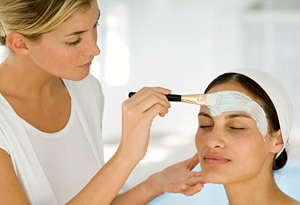
Photo: Pixland/Thinkstock
The Facialist Will See You Now
Because of my personal life experiences and the many years I've spent working with other people, I've developed an intuition and instinct about others' emotional states. I can touch someone and say, "Okay, what's going on?" I'm not psychic, but I can detect when there is pain in someone—when I'm in tune with my client, I can feel what she feels.
For example, one woman came into my clinic with the worst cystic acne I've ever seen in my life. She was so congested that every single pore had become infected, and she had terrible scarring as well. She came to me after a doctor had put her on a cocktail of topical and internal drugs. My team and I got her off the drugs; and with treatments, products, and lifestyle changes, we cleared her skin in three months. But after some time, another cystic infection emerged on her lower cheek. We were both really concerned because this wasn't your average kind of acne.
I sat her down and said, "Let's talk." It took a while, but I finally found out what was going on with her. It turned out that her job had been really stressful because there was someone she didn't get along with, and this had brought up other issues in her life. My client ended up quitting her job, and her acne immediately went away. This is where I teach my clients to connect the dots and figure out the issues that might be triggering their skin problems.
Many times during my career, facials have doubled as therapy sessions—for my clients and for me. Looking back, I can see that one of the reasons I felt so at home in this profession was because it was like a healthy home came to me. Many of my clients were older women around my mom's age, and since I didn't have a functioning mother to actively support my life and my growth, these women played that role. We developed close, meaningful relationships: they encouraged and supported me—like my own mother never could—and I nurtured them, both by caring for their skin and helping to restore their confidence and sense of self through my touch and treatments. I could never help my mom, but I could help these women. It's almost like I've had hundreds of mothers over the years! And some of these women have followed me throughout my career and have stuck by my side. (One of them, Martha Kramer, is a very special client who actually helped me buy my first laser.)
If I've learned anything over the years, it's this: We have to take time for ourselves. If we constantly do things for others and never focus on ourselves, it will tear us down. I have a friend who's a marriage counselor, and she reinforced something that I instinctively knew. She said, "Take care of yourself first—make sure your spirit is healthy. Next, make sure that your relationship with your spouse is healthy. Then you can take care of your children." It's not so much an "order of importance," it's simply a formula that seems to be true because harmony results. If we don't love ourselves, we won't be happy, and that will affect our relationships. If we're arguing constantly with our spouse, the children feel it, and it will be very painful for them. I know—I've been the little girl on the other side of those arguments.
Next: Emotional clues to watch out for
Because of my personal life experiences and the many years I've spent working with other people, I've developed an intuition and instinct about others' emotional states. I can touch someone and say, "Okay, what's going on?" I'm not psychic, but I can detect when there is pain in someone—when I'm in tune with my client, I can feel what she feels.
For example, one woman came into my clinic with the worst cystic acne I've ever seen in my life. She was so congested that every single pore had become infected, and she had terrible scarring as well. She came to me after a doctor had put her on a cocktail of topical and internal drugs. My team and I got her off the drugs; and with treatments, products, and lifestyle changes, we cleared her skin in three months. But after some time, another cystic infection emerged on her lower cheek. We were both really concerned because this wasn't your average kind of acne.
I sat her down and said, "Let's talk." It took a while, but I finally found out what was going on with her. It turned out that her job had been really stressful because there was someone she didn't get along with, and this had brought up other issues in her life. My client ended up quitting her job, and her acne immediately went away. This is where I teach my clients to connect the dots and figure out the issues that might be triggering their skin problems.
Many times during my career, facials have doubled as therapy sessions—for my clients and for me. Looking back, I can see that one of the reasons I felt so at home in this profession was because it was like a healthy home came to me. Many of my clients were older women around my mom's age, and since I didn't have a functioning mother to actively support my life and my growth, these women played that role. We developed close, meaningful relationships: they encouraged and supported me—like my own mother never could—and I nurtured them, both by caring for their skin and helping to restore their confidence and sense of self through my touch and treatments. I could never help my mom, but I could help these women. It's almost like I've had hundreds of mothers over the years! And some of these women have followed me throughout my career and have stuck by my side. (One of them, Martha Kramer, is a very special client who actually helped me buy my first laser.)
If I've learned anything over the years, it's this: We have to take time for ourselves. If we constantly do things for others and never focus on ourselves, it will tear us down. I have a friend who's a marriage counselor, and she reinforced something that I instinctively knew. She said, "Take care of yourself first—make sure your spirit is healthy. Next, make sure that your relationship with your spouse is healthy. Then you can take care of your children." It's not so much an "order of importance," it's simply a formula that seems to be true because harmony results. If we don't love ourselves, we won't be happy, and that will affect our relationships. If we're arguing constantly with our spouse, the children feel it, and it will be very painful for them. I know—I've been the little girl on the other side of those arguments.
Next: Emotional clues to watch out for
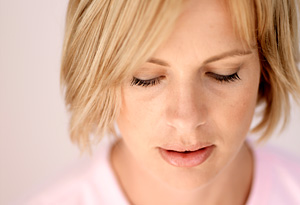
Photo: Stockbyte/Thinkstock
This message was brought home to me recently. Every morning I read a meditation to prepare myself for the day (I really like author Melody Beattie's meditations), and on this particular morning, the one I read was about nurturing yourself. There I was, lying in bed, anticipating a really hectic day with my seven-year-old. I'd promised to take him skiing, and I was worried. My son skis fast, and I'm a nervous Nelly with him sometimes. I didn't think I could keep up; plus, as a mom, I wanted to keep him safe. Not to mention the fact that I was exhausted and wanted to just lie in bed. So I said to myself, Katie, let's find a way to relax and enjoy this time. I decided to take a long, luxurious shower; give myself a hair mask; and put on some makeup before we hit the slopes. Just doing those little things made me much more patient with my son. I was able to nurture him because I had taken the time to nurture myself.
I heard a story from a friend about a college professor who was famous for her over-the-top jewelry: She wore rings on every finger, necklaces, bangles, you name it! It was an affectionate joke around the university that her students knew she was approaching because she jingled. So when she stopped jingling, they knew that something was wrong.
Look out for your own clues. Are you keeping up with your personal grooming? Do you take care of your skin, hair, and nails? Do you take pride in putting yourself together, or does it feel like a chore? If the answer to any of these questions is no, you might want to do a little self-examination and see what's really going on in your life.
Reflecting on yourself can be a vicious cycle. Because when you don't feel good and you don't take care of yourself, it shows. And if you look in the mirror and don't like what you see, that will affect the way you do your job and treat your family, as well as how you feel. My client Lisa Rinna talks a lot about this in her book, Rinnavation. Taking the time to treat yourself impacts every part of your life. You might feel a little selfish, but those extra moments will color your whole attitude in a positive way. When you feel better about yourself, you will perform your every role in life better!
Of course not every skin problem is caused by how you're feeling about yourself or your mental state. Sometimes an outbreak is just an outbreak: it might be hormonal or because you're genetically predisposed to it. But do watch your skin. If you're having problems, ask yourself, "Where am I mentally and emotionally?" You might be getting a sign that it's time to make a change in your life.
Next: Research that proves skin is impacted by your emotions
I heard a story from a friend about a college professor who was famous for her over-the-top jewelry: She wore rings on every finger, necklaces, bangles, you name it! It was an affectionate joke around the university that her students knew she was approaching because she jingled. So when she stopped jingling, they knew that something was wrong.
Look out for your own clues. Are you keeping up with your personal grooming? Do you take care of your skin, hair, and nails? Do you take pride in putting yourself together, or does it feel like a chore? If the answer to any of these questions is no, you might want to do a little self-examination and see what's really going on in your life.
Reflecting on yourself can be a vicious cycle. Because when you don't feel good and you don't take care of yourself, it shows. And if you look in the mirror and don't like what you see, that will affect the way you do your job and treat your family, as well as how you feel. My client Lisa Rinna talks a lot about this in her book, Rinnavation. Taking the time to treat yourself impacts every part of your life. You might feel a little selfish, but those extra moments will color your whole attitude in a positive way. When you feel better about yourself, you will perform your every role in life better!
Of course not every skin problem is caused by how you're feeling about yourself or your mental state. Sometimes an outbreak is just an outbreak: it might be hormonal or because you're genetically predisposed to it. But do watch your skin. If you're having problems, ask yourself, "Where am I mentally and emotionally?" You might be getting a sign that it's time to make a change in your life.
Next: Research that proves skin is impacted by your emotions

Photo: Stockbyte/Thinkstock
I have so many stories that support this point—but the truth is, so does a lot of research. Emotions have a huge impact on your skin, and there is hard scientific evidence to back up the idea. Here are just some of the studies that have been done on the subject:
1. Researchers in Germany discovered that when children went through a traumatic event such as their parents' divorce, a death in the family, or a severe illness before age 14, they had a much higher chance of suffering from eczema.
2. A study funded by the Estée Lauder company, which focused on women going through stressful divorces, showed that their skin recovered much more slowly after injury than skin belonging to women who said that they were happy.
3. The American Journal of Pathology reported that stress activates the skin's immune cells, leading to inflammatory conditions such as dermatitis and psoriasis.
4. A study conducted by the Stanford University School of Medicine showed that the stress of exams caused students' acne to flare up, and that the more stressed the students reported being, the worse the effect on their skin. This has been reinforced by several other studies conducted around the world.
5. In a Japanese study of 26 people with dermatitis, their symptoms got better for two hours after watching a funny movie, even when they were exposed to the allergen that usually triggered their condition. It's believed that laughing reduced their levels of stress hormones.
6. Psoriasis patients who practiced meditation-based relaxation while having ultraviolet (UV) light treatments experienced faster clearing of their skin than those who received the light treatments alone, according to the results of a trial held at the University of Massachusetts Medical School.
7. In a Yale University study, people with melanoma, the deadliest form of skin cancer, were more likely to have lived through a stressful experience during the years leading up to their diagnosis than people who did not have skin cancer. Another study at Johns Hopkins University showed that mice exposed to fox urine (which stressed them out) got skin cancer much more quickly when put under UV rays than mice who weren't exposed.
1. Researchers in Germany discovered that when children went through a traumatic event such as their parents' divorce, a death in the family, or a severe illness before age 14, they had a much higher chance of suffering from eczema.
2. A study funded by the Estée Lauder company, which focused on women going through stressful divorces, showed that their skin recovered much more slowly after injury than skin belonging to women who said that they were happy.
3. The American Journal of Pathology reported that stress activates the skin's immune cells, leading to inflammatory conditions such as dermatitis and psoriasis.
4. A study conducted by the Stanford University School of Medicine showed that the stress of exams caused students' acne to flare up, and that the more stressed the students reported being, the worse the effect on their skin. This has been reinforced by several other studies conducted around the world.
5. In a Japanese study of 26 people with dermatitis, their symptoms got better for two hours after watching a funny movie, even when they were exposed to the allergen that usually triggered their condition. It's believed that laughing reduced their levels of stress hormones.
6. Psoriasis patients who practiced meditation-based relaxation while having ultraviolet (UV) light treatments experienced faster clearing of their skin than those who received the light treatments alone, according to the results of a trial held at the University of Massachusetts Medical School.
7. In a Yale University study, people with melanoma, the deadliest form of skin cancer, were more likely to have lived through a stressful experience during the years leading up to their diagnosis than people who did not have skin cancer. Another study at Johns Hopkins University showed that mice exposed to fox urine (which stressed them out) got skin cancer much more quickly when put under UV rays than mice who weren't exposed.
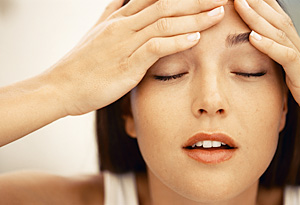
Photo: Stockbyte/Thinkstock
Stress Less
The common denominator here is stress hormones and how they affect our immune system. Researchers have known for some time that stress impacts our ability to fight infections and stay healthy. Acute stress protects us from dangerous situations by stimulating our "fight or flight" response, which temporarily boosts our immune system to deal with whatever is challenging us. That kind of pressure is situational and is relieved when we take care of what's causing it.
Chronic stress is another matter altogether. This is when you're in a constant state of anxiety or fear over ongoing problems such as debt, a negative work situation, illness, an unhappy relationship, loneliness, or just a combination of factors that make up a modern crazy lifestyle. When you're suffering from chronic stress, you're existing in a constant "state of emergency," and your body was not meant to live that way. The continual strain actually depresses your immune system, causing your levels of stress hormones such as adrenaline and cortisol to stay high in your body. Consequently, you develop symptoms such as headaches, backaches, or an upset stomach and you have trouble sleeping. On top of that, when you're anxious or depressed you don't tend to eat properly (or digest the food you do eat) or get enough exercise.
For many of us, chronic stress accumulates in skin problems. Whether we're talking about eczema, acne, or premature aging, we stand a much better chance of keeping them under control if our immune system is functioning strongly.
None of us lives completely stress-free existences. Life would be very bland if we didn't have a little bit of pressure every now and then to motivate and stimulate us. I also want to make the point that we don't have to be unhappy to be stressed. My family life is very fulfilling, for instance, and I have a lot of great things happening in my career; nevertheless, I'm often totally stressed-out by trying to keep a lot of balls in the air at the same time. Going on QVC with my skin-care collection is especially nerve-wracking. I love doing it, but there is so much pressure to ensure that we're giving out the right information and, of course, selling the product—after all, they wouldn't have me back if no one was buying. I also want to be sure that I'm connecting with the viewers and helping them with their skin issues. And it's all live and nonstop. Think about that!
So dealing with stress should be part of your skin-care regimen. There are lots of effective ways to help relieve tension; some of you will respond better to one option than another, which is why I'm giving you several of them to try. Even if you still doubt that your emotions have anything to do with your skin, you'll become a believer after you see the positive results of getting into a regular stress-busting routine.
Next: Improve your skin's health with these 7 stress-reducing techniques
The common denominator here is stress hormones and how they affect our immune system. Researchers have known for some time that stress impacts our ability to fight infections and stay healthy. Acute stress protects us from dangerous situations by stimulating our "fight or flight" response, which temporarily boosts our immune system to deal with whatever is challenging us. That kind of pressure is situational and is relieved when we take care of what's causing it.
Chronic stress is another matter altogether. This is when you're in a constant state of anxiety or fear over ongoing problems such as debt, a negative work situation, illness, an unhappy relationship, loneliness, or just a combination of factors that make up a modern crazy lifestyle. When you're suffering from chronic stress, you're existing in a constant "state of emergency," and your body was not meant to live that way. The continual strain actually depresses your immune system, causing your levels of stress hormones such as adrenaline and cortisol to stay high in your body. Consequently, you develop symptoms such as headaches, backaches, or an upset stomach and you have trouble sleeping. On top of that, when you're anxious or depressed you don't tend to eat properly (or digest the food you do eat) or get enough exercise.
For many of us, chronic stress accumulates in skin problems. Whether we're talking about eczema, acne, or premature aging, we stand a much better chance of keeping them under control if our immune system is functioning strongly.
None of us lives completely stress-free existences. Life would be very bland if we didn't have a little bit of pressure every now and then to motivate and stimulate us. I also want to make the point that we don't have to be unhappy to be stressed. My family life is very fulfilling, for instance, and I have a lot of great things happening in my career; nevertheless, I'm often totally stressed-out by trying to keep a lot of balls in the air at the same time. Going on QVC with my skin-care collection is especially nerve-wracking. I love doing it, but there is so much pressure to ensure that we're giving out the right information and, of course, selling the product—after all, they wouldn't have me back if no one was buying. I also want to be sure that I'm connecting with the viewers and helping them with their skin issues. And it's all live and nonstop. Think about that!
So dealing with stress should be part of your skin-care regimen. There are lots of effective ways to help relieve tension; some of you will respond better to one option than another, which is why I'm giving you several of them to try. Even if you still doubt that your emotions have anything to do with your skin, you'll become a believer after you see the positive results of getting into a regular stress-busting routine.
Next: Improve your skin's health with these 7 stress-reducing techniques
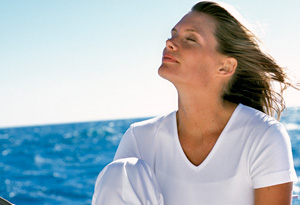
Photo: Pixland/Thinkstock
Try out one or more of the following suggestions, and then enjoy the "beauty bonus" that results:
If you're feeling anxious, you may be breathing fast and shallowly or even holding your breath altogether. Get into the habit of stopping for a few minutes to concentrate on taking slow, deep breaths; it's a no-fail way to calm both your body and your mind.
Sit quietly somewhere and just become conscious of how you're breathing. The idea is to slow down to about 5 or 6 breaths a minute (the usual is about 15). Inhale deeply, using your diaphragm and pushing out your abdomen. Hold it for a few counts (but not so long that it makes you dizzy), and then very slowly let out the air. Studies have shown that this kind of breathing lowers your blood pressure and is beneficial to your health in many other ways—not the least of which is that it stimulates the flow of lymphatic fluid through your body, which in turn boosts your immune system.
I use this method before my QVC broadcasts. Along with breathing, I do a visualization in which I picture the world. Then, when I'm looking into the camera, I imagine sending out a cloud of love and protection to surround the planet. And I have to tell you, there were times at QVC when I was so nervous because I knew that on live TV you can't make a mistake and you have to perform. But once I discovered this technique, it really helped calm me.
Watch a yoga instructor demonstrate the basics of breath.
Beauty bonus: As well as getting you to relax, deep breathing affects blood circulation and the oxygenation of your cells, including those in your skin. And all cells need a steady stream of oxygen to keep them alive, deliver nutrition, and do their job properly.
If you're feeling anxious, you may be breathing fast and shallowly or even holding your breath altogether. Get into the habit of stopping for a few minutes to concentrate on taking slow, deep breaths; it's a no-fail way to calm both your body and your mind.
Sit quietly somewhere and just become conscious of how you're breathing. The idea is to slow down to about 5 or 6 breaths a minute (the usual is about 15). Inhale deeply, using your diaphragm and pushing out your abdomen. Hold it for a few counts (but not so long that it makes you dizzy), and then very slowly let out the air. Studies have shown that this kind of breathing lowers your blood pressure and is beneficial to your health in many other ways—not the least of which is that it stimulates the flow of lymphatic fluid through your body, which in turn boosts your immune system.
I use this method before my QVC broadcasts. Along with breathing, I do a visualization in which I picture the world. Then, when I'm looking into the camera, I imagine sending out a cloud of love and protection to surround the planet. And I have to tell you, there were times at QVC when I was so nervous because I knew that on live TV you can't make a mistake and you have to perform. But once I discovered this technique, it really helped calm me.
Watch a yoga instructor demonstrate the basics of breath.
Beauty bonus: As well as getting you to relax, deep breathing affects blood circulation and the oxygenation of your cells, including those in your skin. And all cells need a steady stream of oxygen to keep them alive, deliver nutrition, and do their job properly.

Photo: Comstock/Thinkstock
Do you feel like your shoulders and neck are as tight as a drum? If so, you'll be happy to discover progressive relaxation, which is a great way to relieve muscle tension caused by stress.
Take off your shoes and loosen any tight clothing. Lie flat on the floor with your feet slightly apart and your arms by your sides, palms up. Cover yourself with a cozy blanket, if you like.
Become conscious of your breath. As you inhale, scrunch up a set of muscles as tightly as you can for about ten seconds, starting with your feet. Then, while you exhale, consciously let those muscles go—just let them flop. You're going to work your way up your body like this: legs, buttocks, stomach, chest, hands, arms, shoulders, neck, and face (including your tongue), clenching or stretching and then releasing. Allow all the tension to just melt away . . . until your entire body feels heavy, relaxed, and supported by the floor. You might even drift off to sleep, but do try to stay awake until you've worked your way through your entire body.
Once you become familiar with how relaxed muscles feel, you'll be able to release them throughout the day whenever you become aware that you're tensing up.
Beauty bonus: There are dozens of small muscles in the face, and it's one of the places we hold tension without realizing it. Notice if your face is tensed up at night, even as your head hits the pillow. Only when you consciously relax those muscles around your eyes, mouth, and jaw will you become aware of how you're contributing to the formation of wrinkles.
Take off your shoes and loosen any tight clothing. Lie flat on the floor with your feet slightly apart and your arms by your sides, palms up. Cover yourself with a cozy blanket, if you like.
Become conscious of your breath. As you inhale, scrunch up a set of muscles as tightly as you can for about ten seconds, starting with your feet. Then, while you exhale, consciously let those muscles go—just let them flop. You're going to work your way up your body like this: legs, buttocks, stomach, chest, hands, arms, shoulders, neck, and face (including your tongue), clenching or stretching and then releasing. Allow all the tension to just melt away . . . until your entire body feels heavy, relaxed, and supported by the floor. You might even drift off to sleep, but do try to stay awake until you've worked your way through your entire body.
Once you become familiar with how relaxed muscles feel, you'll be able to release them throughout the day whenever you become aware that you're tensing up.
Beauty bonus: There are dozens of small muscles in the face, and it's one of the places we hold tension without realizing it. Notice if your face is tensed up at night, even as your head hits the pillow. Only when you consciously relax those muscles around your eyes, mouth, and jaw will you become aware of how you're contributing to the formation of wrinkles.
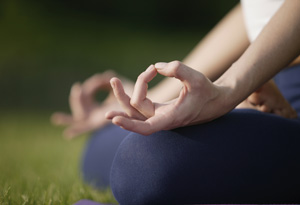
Photo: Thinkstock
I became convinced about the power of meditation after I witnessed significant changes in the skin of several of my clients who practice it. It really made me aware that I may be able to help someone topically or assist her in altering her diet, but if I can't help her find a way to stop her brain craziness, she's simply not going to look her best.
Meditation is a state of deep physical relaxation combined with acute mental alertness, and there are many ways to achieve this state. Almost every religion incorporates meditative practices such as praying or chanting, and you might be able to find one in your belief system. Other purely physiological techniques involve sitting and focusing on something that will hold your attention: a word, an image, your breath, or a visual cue.
Find a place to sit where you won't be disturbed for anywhere from 5 to 30 minutes. You don't have to sit cross-legged on the floor unless you want to. It's perfectly fine to sit in a straight-backed chair with your feet flat on the ground and your hands resting in your lap.
Close your eyes. Breathe easily and naturally, but focus on the feeling of your breath entering and leaving your body: notice how it feels cool as you breathe in and warm as you breathe out. As you relax, start to silently say a word as you exhale. It can be anything that's meaningful to you; many people repeat peaceful words such as love or simply one. You can also meditate on something visual: your child's face, a flower, the ocean, or anything that makes you feel happy and serene.
The idea here is to clear your head of your inner chatter. It's impossible to make your mind empty, of course, but if you find yourself dwelling on the subjects that stress you out, bring your attention back to your breath and the word you're saying or the image you're visualizing.
Meditating is most effective as a stress reliever when you do it regularly, so try to carve out a few minutes every day for your practice. I know that it's not always easy to meditate at first, which is why a great tool to help you get started is a guided-meditation CD. A couple you might find helpful are The Beginner's Guide to Meditation by Joan Z. Borysenko, Ph.D., and Meditations for Overcoming Life's Stresses and Strains by Bernie S. Siegel, M.D.
Start your meditation practice with this 30-day course.
Beauty bonus: Meditation causes stress hormones in your blood to drop and boosts your immune system.
Meditation is a state of deep physical relaxation combined with acute mental alertness, and there are many ways to achieve this state. Almost every religion incorporates meditative practices such as praying or chanting, and you might be able to find one in your belief system. Other purely physiological techniques involve sitting and focusing on something that will hold your attention: a word, an image, your breath, or a visual cue.
Find a place to sit where you won't be disturbed for anywhere from 5 to 30 minutes. You don't have to sit cross-legged on the floor unless you want to. It's perfectly fine to sit in a straight-backed chair with your feet flat on the ground and your hands resting in your lap.
Close your eyes. Breathe easily and naturally, but focus on the feeling of your breath entering and leaving your body: notice how it feels cool as you breathe in and warm as you breathe out. As you relax, start to silently say a word as you exhale. It can be anything that's meaningful to you; many people repeat peaceful words such as love or simply one. You can also meditate on something visual: your child's face, a flower, the ocean, or anything that makes you feel happy and serene.
The idea here is to clear your head of your inner chatter. It's impossible to make your mind empty, of course, but if you find yourself dwelling on the subjects that stress you out, bring your attention back to your breath and the word you're saying or the image you're visualizing.
Meditating is most effective as a stress reliever when you do it regularly, so try to carve out a few minutes every day for your practice. I know that it's not always easy to meditate at first, which is why a great tool to help you get started is a guided-meditation CD. A couple you might find helpful are The Beginner's Guide to Meditation by Joan Z. Borysenko, Ph.D., and Meditations for Overcoming Life's Stresses and Strains by Bernie S. Siegel, M.D.
Start your meditation practice with this 30-day course.
Beauty bonus: Meditation causes stress hormones in your blood to drop and boosts your immune system.
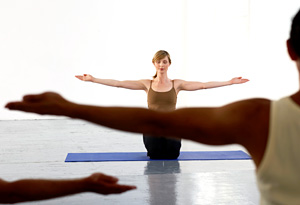
Photo: Digital Vision/Thinkstock
Like meditation, yoga is another ancient practice that's a terrific stress buster for our modern times and is credited with any number of health and psychological benefits. The whole yoga scene can be a bit confusing, however, as there are so many different styles available now. It can be soothing if you choose a style that's oriented toward flexibility and stretching, or what you'll often hear called "restorative yoga." Or it can be more energizing if you go with a flow-and-strength approach that challenges your heart and muscles—if this appeals to you, then power yoga would be the way to go. Some types of yoga are strictly physical, while others have a spiritual component; many also incorporate breathing exercises.
Telling you how to do yoga is outside the scope of this book, but it's so popular that you're sure to find a class near you. If you prefer to practice alone, however, there are hundreds of books, CDs, and DVDs on the market where you can find instruction. No matter if you take a class or pursue yoga on your own, be sure to look into the different types so that you find the method that works best for relieving your stress.
Watch instructor Seane Corn's yoga videos.
Beauty bonus: Classical hatha yoga (as opposed to other more rigorous forms and the hybrid classes that are popular now) was studied at Jefferson Medical College in Philadelphia and found to reduce cortisol levels, which, as you now know, contribute to unhealthy skin.
I'd also like to add that many of my Hollywood celebrity clients are yoga fanatics. I can always identify them because they have that "yoga body"—a lean, balanced, graceful look that's a definite beauty bonus.
Telling you how to do yoga is outside the scope of this book, but it's so popular that you're sure to find a class near you. If you prefer to practice alone, however, there are hundreds of books, CDs, and DVDs on the market where you can find instruction. No matter if you take a class or pursue yoga on your own, be sure to look into the different types so that you find the method that works best for relieving your stress.
Watch instructor Seane Corn's yoga videos.
Beauty bonus: Classical hatha yoga (as opposed to other more rigorous forms and the hybrid classes that are popular now) was studied at Jefferson Medical College in Philadelphia and found to reduce cortisol levels, which, as you now know, contribute to unhealthy skin.
I'd also like to add that many of my Hollywood celebrity clients are yoga fanatics. I can always identify them because they have that "yoga body"—a lean, balanced, graceful look that's a definite beauty bonus.
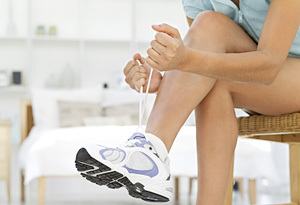
Photo: Thinkstock
Exercise, particularly cardio (that is, the kind that makes your heart really pump) is known to help relieve stress, boost spirits, fight symptoms of depression, and increase your brain's production of those feel-good endorphins. Endorphins are responsible for what's known as the "runner's high," but any vigorous activity promotes this same response, be it cycling, dancing, swimming, or playing sports.
Not all exercise needs to be strenuous, however—something like a 30-minute walk, especially outdoors, can give you a very healthy payoff. In fact, when I see people in my clinic who are clearly in a funk and can't seem to muster the energy to get out of it, I always say that the best thing is to go for a walk. That alone can change how you feel about yourself.
I try to exercise every morning. Like deep breathing, I know that physical activity also helps my lymphatic fluid get moving through my body, sweeping out cellular debris and toxins and boosting my immune system.
The incredible health benefits of exercise that will convince you to get moving.
Beauty bonus: Exercise does more than just lift your spirits. It gets your blood flowing and increases oxygen flow throughout your body, including to your skin. Researchers have recently found a direct link between moderate exercise and decreased inflammation of damaged skin tissue, and they think that it might have something to do with this increased blood and oxygen. Studies also show that the skin of those who exercise is physically thicker than those who don't.
Not all exercise needs to be strenuous, however—something like a 30-minute walk, especially outdoors, can give you a very healthy payoff. In fact, when I see people in my clinic who are clearly in a funk and can't seem to muster the energy to get out of it, I always say that the best thing is to go for a walk. That alone can change how you feel about yourself.
I try to exercise every morning. Like deep breathing, I know that physical activity also helps my lymphatic fluid get moving through my body, sweeping out cellular debris and toxins and boosting my immune system.
The incredible health benefits of exercise that will convince you to get moving.
Beauty bonus: Exercise does more than just lift your spirits. It gets your blood flowing and increases oxygen flow throughout your body, including to your skin. Researchers have recently found a direct link between moderate exercise and decreased inflammation of damaged skin tissue, and they think that it might have something to do with this increased blood and oxygen. Studies also show that the skin of those who exercise is physically thicker than those who don't.
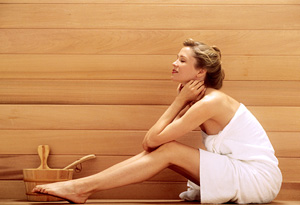
Photo: Comstock/Thinkstock
Exercising really hard is certainly one way to work up a sweat, but I believe that sweating in general is amazing. When you're in a sauna, steam room, or hot tub (my personal favorite) and your body gets to that elevated heat level, it releases emotional pain from your body. Of course, it also helps with physical aches and pains and the stiff muscles that result from a stressful lifestyle.
I don't believe it's by chance that so many cultures have some kind of "sweat bath" tradition: from hammams ("Turkish baths") to sweat lodges, people all around the world and all throughout time have enjoyed the benefits of steaming toxins from the skin. Ayurveda—the ancient Indian healing tradition—alone uses 13 ways to make you sweat!
Just be sure to stay hydrated when you practice this stress buster; that is, drink plenty of water to replace what you're losing. If exercise gives you shortness of breath or chest pains, then stay away from excessive heat sources. I also recommend that you avoid the Scandinavian practice of going from heat to a cold shower. In addition, pregnant women should forgo saunas, steam rooms, and hot tubs, especially in their first trimester.
Beauty bonus: Steam is a basic component of a facial because it opens your pores and helps with cleansing. Heat also relaxes blood vessels and improves circulation.
I don't believe it's by chance that so many cultures have some kind of "sweat bath" tradition: from hammams ("Turkish baths") to sweat lodges, people all around the world and all throughout time have enjoyed the benefits of steaming toxins from the skin. Ayurveda—the ancient Indian healing tradition—alone uses 13 ways to make you sweat!
Just be sure to stay hydrated when you practice this stress buster; that is, drink plenty of water to replace what you're losing. If exercise gives you shortness of breath or chest pains, then stay away from excessive heat sources. I also recommend that you avoid the Scandinavian practice of going from heat to a cold shower. In addition, pregnant women should forgo saunas, steam rooms, and hot tubs, especially in their first trimester.
Beauty bonus: Steam is a basic component of a facial because it opens your pores and helps with cleansing. Heat also relaxes blood vessels and improves circulation.
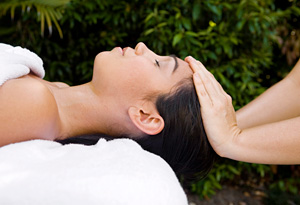
Photo: BananaStock/Thinkstock
I've already told you how bodywork has helped me deal with the childhood pain I continue to hold in my body—I recommend finding a good bodyworker to everyone. The most commonly available type of bodywork is massage, and you don't have to be a scientist to know that getting one of these is a great way to get rid of stress. But massage has also been shown to reduce anxiety, elevate mood, ease pain, lower blood pressure, and be helpful with insomnia. It seems to promote the release of the brain's natural opiates, which encourages a feeling of well-being. Add in restful music and aromatherapy—particularly when you use calming essential oils, such as lavender, neroli, and sandalwood—and you get extra benefits.
There are a number of different types of massage. Just as with yoga, there are some that are gentle and relaxing and others that are more vigorous. Swedish massage is the one you're most likely to run across, and it's a good one to try if you're new to the idea because it's soothing and gentle. Deep-tissue massage targets deeper layers of muscle and connective tissue and can be quite intense. Yet there are any number of styles in between, such as Shiatsu, Thai, reflexology (which targets your feet), and hot stone. There are even specific massages for athletes, pregnant women, and the elderly.
If you want to experiment with different styles to find the one that de-stresses you the most, see if there is a massage-therapy school in your area—they often want volunteers for students to practice on. And if you've never experienced a massage because you feel a bit uncomfortable about the idea of undressing and lying naked under a sheet while a stranger touches you, break yourself in with a 10- or 15-minute neck-and-shoulder massage. These are increasingly available all over the place. Once you become aware of how amazing massage can be, you'll be hooked.
Beauty bonus: One particular type of massage promotes lymphatic drainage. As I mentioned previously, your lymphatic system is a complex network of vessels, ducts, and organs that is responsible for moving toxins away from healthy cells. Massage aids in moving the fluid through that system, helping eliminate metabolic waste, excess fluid, and bacteria. Lymphatic massage also assists in hydrating your skin, dispersing toxins, and clearing up acne; and it may even improve the appearance of cellulite.
Next: Find the beauty of balance
There are a number of different types of massage. Just as with yoga, there are some that are gentle and relaxing and others that are more vigorous. Swedish massage is the one you're most likely to run across, and it's a good one to try if you're new to the idea because it's soothing and gentle. Deep-tissue massage targets deeper layers of muscle and connective tissue and can be quite intense. Yet there are any number of styles in between, such as Shiatsu, Thai, reflexology (which targets your feet), and hot stone. There are even specific massages for athletes, pregnant women, and the elderly.
If you want to experiment with different styles to find the one that de-stresses you the most, see if there is a massage-therapy school in your area—they often want volunteers for students to practice on. And if you've never experienced a massage because you feel a bit uncomfortable about the idea of undressing and lying naked under a sheet while a stranger touches you, break yourself in with a 10- or 15-minute neck-and-shoulder massage. These are increasingly available all over the place. Once you become aware of how amazing massage can be, you'll be hooked.
Beauty bonus: One particular type of massage promotes lymphatic drainage. As I mentioned previously, your lymphatic system is a complex network of vessels, ducts, and organs that is responsible for moving toxins away from healthy cells. Massage aids in moving the fluid through that system, helping eliminate metabolic waste, excess fluid, and bacteria. Lymphatic massage also assists in hydrating your skin, dispersing toxins, and clearing up acne; and it may even improve the appearance of cellulite.
Next: Find the beauty of balance

Photo: Brand X Pictures/Thinkstock
The Beauty of Balance
Building a multifaceted business such as mine can be very stressful, even though I love every minute of it. As I've gone down this professional skin-care path, I've encountered my fair share of obstacles and dead ends. When I've come up against a wall, sometimes it's taken me down and I've been crushed; other times I've just thought, Oh, wrong way. But every single time I've learned something.
I believe that if you're blocked, it's most often because you're supposed to look in another direction, so go another way. Life is almost like a maze, and when you don't know which way to go or what path to choose, try what I do: look to your higher power for guidance and direction.
When you pray or meditate or are just quiet in nature, life will come to be more balanced. When you're not balanced, you tend to be locked in that survival mode. I've had some huge decisions to make recently, personally and professionally. And getting quiet was the only way I was able to come to the right ones. Eckhart Tolle's book The Power of Now has had a big influence on me. I used to react to every thought I had, be it positive or negative. I'd go in all different directions and make hasty decisions, changing my mind often. Once I became aware of my behavior, I realized that I could sit on a feeling and wait for a decision. I now encourage my clients to find their present moment and their state of balance, since balance will always benefit the skin.
Kate Somerville is a widely respected paramedical aesthetician with more than 18 years of experience in clinical skincare. She is the CEO and founder of Kate Somerville Skin Care and is the author of Complexion Perfection! Learn more at KateSomerville.com.
Keep Reading:
Give yourself an all-natural facial at home
7 ways to reduce stress
Skin problems caused by stress and anxiety
Building a multifaceted business such as mine can be very stressful, even though I love every minute of it. As I've gone down this professional skin-care path, I've encountered my fair share of obstacles and dead ends. When I've come up against a wall, sometimes it's taken me down and I've been crushed; other times I've just thought, Oh, wrong way. But every single time I've learned something.
I believe that if you're blocked, it's most often because you're supposed to look in another direction, so go another way. Life is almost like a maze, and when you don't know which way to go or what path to choose, try what I do: look to your higher power for guidance and direction.
When you pray or meditate or are just quiet in nature, life will come to be more balanced. When you're not balanced, you tend to be locked in that survival mode. I've had some huge decisions to make recently, personally and professionally. And getting quiet was the only way I was able to come to the right ones. Eckhart Tolle's book The Power of Now has had a big influence on me. I used to react to every thought I had, be it positive or negative. I'd go in all different directions and make hasty decisions, changing my mind often. Once I became aware of my behavior, I realized that I could sit on a feeling and wait for a decision. I now encourage my clients to find their present moment and their state of balance, since balance will always benefit the skin.
Kate Somerville is a widely respected paramedical aesthetician with more than 18 years of experience in clinical skincare. She is the CEO and founder of Kate Somerville Skin Care and is the author of Complexion Perfection! Learn more at KateSomerville.com.
Keep Reading:
Give yourself an all-natural facial at home
7 ways to reduce stress
Skin problems caused by stress and anxiety
Excerpted from Complexion Perfection! by Kate Somerville. Copyright © 2010 by Kate Somerville. Excerpted by permission of Hay House.



